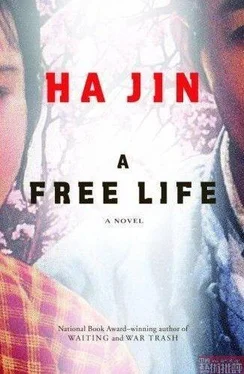The Wangs had worshipped the God of Wealth. In a tiny alcove in the restaurant's dining room, this deity was represented by a porcelain statuette, like a smiling Buddha, with a bulging belly and ruddy, smooth cheeks. At his bare feet sat bowls of tangerines, apples, peaches, cookies, two miniature cups of rice wine, and four smoking joss sticks stuck in a brass censer. Nan and Pingping had mixed feelings about this superstitious practice, but should they evict the god? What if there indeed existed such a supernatural power that could decide the vicissitudes of their fortunes? In any event, they mustn't offend this deity, so they decided to leave him undisturbed and make similar offerings to him.
For several days, even when Nan was working at the cutting board and the sizzling wok, Pope's lines would echo in his mind: "Happy the man whose wish and care / A few paternal acres bound, / Content to breathe his native air / In his own ground." He was aware that he wasn't completely at home here, but still he felt that his feet were finally standing on solid, independent ground.
Unlike the Wangs, the Wus kept the restaurant quiet and didn't play any music. They had grown up with loudspeakers everywhere, punctuating their daily life with roaring songs and jarring slogans, so they detested any kind of sound pollution that forced people to listen to it regardless of their states of mind. They had changed the menu; Nan added a few more dishes and decided not to use MSG in anything they offered. Also, he prepared some dishes differently. For example, formerly the cold cuts called Five-Spice Beef would be piled on a plate with sliced meat atop slivers of cucumber. This was misleading or deceptive, because there was actually more vegetable than meat. Now Nan put the beef and the cucumber in separate piles on the same plate, so the customer could see how much meat and vegetable were actually served. He wanted to be honest. He understood that, unlike in China, here honesty was one's best credit. His wife and son liked the various kinds of chicken he made, especially Strange-Flavored Chicken, a Szechuan dish. Another improvement was that he would change the frying oil every three days. Most Chinese restaurants did this once a week, which often contributed to the unfresh taste of their foods. Most American restaurants used new oil every day. For the Chinese, such waste amounted to a sin. For decades, cooking oil had been rationed in China, each urban resident entitled to only four ounces a month; as for the people in the countryside, a whole household had been allocated only a few pounds a year. These days Nan often thought that if his parents had seen him pour a trough of used vegetable oil into plastic jugs for disposal, they'd have chastised him, not to mention the piles of chicken skin and pork fat he dumped into the trash can every day.
Tammie, the waitress, was very fond of Taotao and talked to him whenever she wasn't busy. Since school hadn't started yet, the boy came to the restaurant with his parents every day. Pingping made him read books and do math problems in a booth when business was slow in the early mornings and afternoons. Nan noticed that Tam-mie often avoided speaking to Pingping, perhaps because his wife was much better-looking than she was. He realized that the waitress had probably lived a lonesome life. Very likely, she longed to have a family; she was at least twenty-seven or twenty-eight. With her broad cheeks and heavyset body, she couldn't easily fetch a bridegroom here unless she had a lot of money or a green card, neither of which she possessed. Nan knew he might get into trouble if the INS caught him employing her, but it was unlikely that the agents would swoop down on such a small restaurant. Tammie often said she missed her parents, who had emigrated to Malaysia from southern China in the 1940s. Nan paid her three dollars an hour besides letting her keep all the tips, because she also helped do dishes and kitchen chores, mainly stringing beans and wrapping wontons, dumplings, and egg rolls. This way he wouldn't have to hire another hand, and Tammie was pleased with the arrangement. What Nan liked most about her was that she spoke English all the time, which was good practice for him and Pingping. Tammie understood Mandarin but couldn't speak it fluently.
In the first week the restaurant made a profit of almost six hundred dollars. Nan and Pingping were amazed. This place was a little bonanza, and business would almost certainly go up in the fall. It looked like they might indeed build a small fortune if they ran the Gold Wok well.
The Wangs lived just on the other side of Beaver Hill Plaza. Their house, a two-story brick bungalow painted gray, was visible from the restaurant. Nan and Pingping envied the proximity of their house to the Gold Wok. If only they could own a home so close by. They asked Mr. Wang teasingly whether he'd sell his house to them as well. "Give me one hundred and fifty thousand, it's yours," the old man told them in earnest. That was too high a price, at least $40,000 above its assessed value.
Because the Wangs lived nearby, whenever Nan needed help, he'd ask Mrs. Wang to come in and work a few hours. The old woman was more than happy to do that, to make a couple of dollars. Sometimes Mr. Wang would drop in and palaver with Nan and Pingping. He was often bored at home despite having on his roof the satellite dish called "the Little Ear," which enabled him to watch many TV shows in Mandarin and Cantonese. There were few Chinese living nearby- most of the Asian immigrants lived in Duluth, a town seven miles to the northeast-and the Wangs seemed to have no friends here. They had a daughter working for a Taiwanese airline in Seattle. She was there just temporarily, so the Wangs wouldn't go and join her. The old man would sigh and say to Pingping, " America is a good place only for young people. Once you're old, you feel awful living here, just a nuisance. "
"Why won't you go back to China?" Pingping asked, knowing he had been born in Fujian Province. "I heard that lots of people bought retirement homes there."
"I wish we could do that. It costs too much. Besides, I don't trust the mainland government."
"How about Taiwan? Can't you live there?"
"The same thing. The legal system is a slum there, not a good place to retire to. Many people are desperate to leave the island. They don't want to get trapped there when the mainland launches an attack."
"How about Singapore?"
" That small country is just like another province of China. The Chinese government controls nearly everything there. Here's a copy of the United Morning Post, published in Singapore. You should read it. Terrible. The paper not only uses the Communists' language but also reprints the news distorted by the mainland media."
"Do you plan to stay here for many years?"
" Hard to say. "
To a degree, Nan and Pingping felt uneasy about the Wangs' situation and often talked about the old couple. They couldn't help but imagine their own old age, though it was still far away. It must be frightening to lead such an isolated life. Would they end up like the Wangs, who wandered around like scarecrows, still out of place after living here for three decades?
Probably not. Unlike them, Nan and Pingping spoke English better and were never afraid of isolation. They wanted to take root here, having nowhere else to go. That was why Nan had seized every opportunity to learn English. He knew that in this land the language was like a body of water in which he had to learn how to swim and breathe, even though he'd feel out of his element whenever he used it. If he didn't try hard to adapt himself, developing new "lungs and gills" for this alien water, his life would be confined and atrophied, and eventually wither away.
Whenever Nan had a free moment at work, he would read his Oxford Advanced Learner's Dictionary because it was monolingual. He still used his bilingual dictionary, which was getting tattered, especially when he couldn't figure out what a noun referred to as described in English. He could see that on the whole the definitions of the word entries written in English were more accurate than those given in Chinese. In addition, using the monolingual dictionary was a way to make himself think in English. He highlighted the words and phrases unfamiliar to him so that he could review them after he went over the entire volume. He had also bought a softcover New English-Chinese Dictionary for Pingping, but she seldom bothered to open it. Even when she came across a new word in her reading, she wouldn't look it up, able to figure out its meaning from the context most times. She was so smart that she had little need for a dictionary.
Читать дальше












